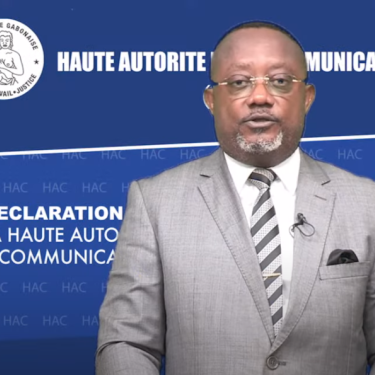Journalists excluded from process of naming Gabonese media regulator’s members

Reporters Without Borders (RSF) urges the Gabonese authorities to reverse their anachronistic decision to exclude journalists from the process of naming the members of the High Authority for Communication (HAC), the country’s media regulator. This is a dangerous step backwards in the run-up to next month’s presidential election, RSF says.
“Everything done for us without us is done against us,” said Obame Ngomo, the president of the Media Owners Organisation (OPAM), referring to the law changing how the HAC’s members are appointed, which was promulgated on 3 July.
Under the new law, Gabon’s president, the National Assembly president and the Senate president each choose three of the HAC’s nine members. This was how the National Communication Council’s nine members were chosen before it was replaced by the HAC in 2018. Until this new law took effect, Gabon’s journalists chose two of the HAC’s nine members. Now they have been reduced to the level of spectators and they fear that the HAC will just do the government’s bidding.
Gabon is moving backwards. Reducing journalists to mere spectators on crucial issues concerning the regulation of journalism is anachronistic. Allowing the authorities to appoint all of the HAC’s members opens the door to disturbing abuses and arbitrary decisions. An impartial regulator, in which debate is accepted and encouraged, should be a priority in Gabon, especially on the eve of a presidential election. We urge the authorities to reverse this dangerous reform in order to include journalists in the process of appointing the HAC’s members.
The grounds for changing the method of appointing the HAC’s members are unclear. “We met the authorities in an attempt to understand the motives for changing the law but no one wanted to take responsibility for the change,” Ngomo said.
The change to this organic law was carried out in a completely opaque manner. RSF has been told that the official gazette did not publish the new law until mid-July and that not even the HAC’s members had access to it before then.
The HAC’s new nine members were nonetheless named at the start of July and held a meeting on 12 July at which they took decisions. They issued formal warnings to three media outlets and suspended a fourth for a month. All were media outlets that support the government. They were sanctioned in response to a complaint by the leader of the opposition National Union party, who accused them of “harming the reputation of National Union leaders.”
Without journalists acting directly as safeguards, it cannot be concluded from these sanctions that the government is not manipulating the HAC for political purposes. Most of the HAC’s six new members are former journalists, but they are now pursuing political careers. How independent they are from the government is questionable.
“The political authorities have appointed people who will do as they are told when the authorities need them to sanction the media,” said Abel Mimongo, one of the two journalists who were chosen by their fellow journalists to be HAC members in June 2018. The other was Timothée Boussiengui. Their terms as HAC members ended at the start of July.
The HAC’s overhaul comes just weeks before the first round of Gabon’s presidential election on 26 August, in which Ali Bongo, the country’s president since 2009, is seeking a third term.
